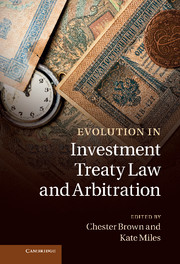Book contents
- Frontmatter
- Contents
- Contributors
- Editors' preface and acknowledgements
- Table of cases
- Table of Treaties
- Part I Introduction
- Part II Shifts in fundamental character
- 2 Conflict and conflicts in investment treaty arbitration: Ethical standards for counsel
- 3 Recent developments in the approach to identifying an ‘investment’ pursuant to Article 25(1) of the ICSID Convention
- 4 Investment treaty interpretation and customary investment law: Preliminary remarks
- 5 The public–private dualities of international investment law and arbitration
- 6 Outline of a normative framework for evaluating interpretations of investment treaty protections
- 7 Investment treaty arbitration as global administrative law: What this might mean in practice
- Part III Actors in international investment law
- Part IV The new significance of procedure
- Part V Engagement with cross-cutting issues
- Part VI Conclusions
- Index
- References
7 - Investment treaty arbitration as global administrative law: What this might mean in practice
from Part II - Shifts in fundamental character
Published online by Cambridge University Press: 05 December 2011
- Frontmatter
- Contents
- Contributors
- Editors' preface and acknowledgements
- Table of cases
- Table of Treaties
- Part I Introduction
- Part II Shifts in fundamental character
- 2 Conflict and conflicts in investment treaty arbitration: Ethical standards for counsel
- 3 Recent developments in the approach to identifying an ‘investment’ pursuant to Article 25(1) of the ICSID Convention
- 4 Investment treaty interpretation and customary investment law: Preliminary remarks
- 5 The public–private dualities of international investment law and arbitration
- 6 Outline of a normative framework for evaluating interpretations of investment treaty protections
- 7 Investment treaty arbitration as global administrative law: What this might mean in practice
- Part III Actors in international investment law
- Part IV The new significance of procedure
- Part V Engagement with cross-cutting issues
- Part VI Conclusions
- Index
- References
Summary
Introduction
In 2008, Professor Jan Paulsson gave an address in Montreal in which he declared dramatically that ‘international arbitration is not arbitration’. It is not the aim of the present chapter to contend that investment treaty arbitration is not arbitration. That is a feat of debating for which only Professor Paulsson would be qualified. However, the premise advanced does have more than a whiff of paradox about it: that bilateral investment treaties (BITs) are not international investment agreements; they are instruments of global administrative law. The purpose of this chapter is to consider what this might mean in practice.
My premise is nothing new. It was the central thesis of Gus van Harten's seminal 2007 book, Investment Treaty Arbitration and Public Law. In that book, he neatly summarised his case as follows:
Investment treaty arbitration is often viewed as a form of reciprocally consensual adjudication between an investor and a state. The argument of this chapter is that it should be viewed as a mechanism of adjudicative review in public law. That is the case for two reasons: first, the system is established by a sovereign act of the state; second, it is predominantly used to resolve disputes arising from the exercise of sovereign authority . . . As a public law system, investment treaty arbitration engages the regulatory relationship between state and individual, rather than a reciprocal relationship between juridical equals. Indeed, unlike any other form of international arbitration, it gives private arbitrators a comprehensive jurisdiction over disputes in the regulatory sphere.
- Type
- Chapter
- Information
- Evolution in Investment Treaty Law and Arbitration , pp. 145 - 160Publisher: Cambridge University PressPrint publication year: 2011
References
- 1
- Cited by

